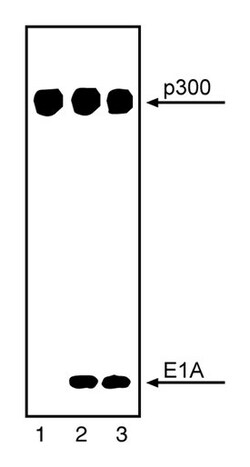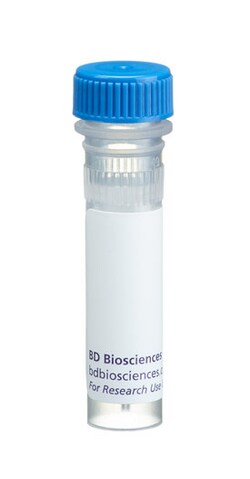Learn More
p300 Mouse anti-Human, Unlabeled, Clone: NM11, BD
Mouse Monoclonal Antibody
Supplier: BD Biosciences 554215
Description
Many serotypes of human adenoviruses (Ad) are able to transform rodent cells in culture because of functions encoded by early region adenovirus 1A (E1A) and 1B (E1B) genes. These virus early gene products bind to specific cellular proteins that normally act to restrict cell growth. The E1A gene, essential for viral replication, encodes protein products with three amino acid regions (1, 2 and 3) conserved among all known adenovirus serotypes. Regions 1 and 2 and the relatively unconserved amino terminus (N) are E1A sequences required for cell growth-regulating functions. The region 2 site binds the retinoblastoma (Rb) and Rb related proteins, p107 and p130. The amino terminal site binds p300, a large cellular DNA binding protein. p300 is a relatively stable, ubiquitously expressed, nuclear phosphoprotein which is conserved among a variety of mammalian species. It is actively synthesized and phosphorylated in both quiescent and proliferating cells. A phosphatase sensitive form with decreased mobility has been identified in M-phase enriched cell populations. Evidence suggests that p300 plays a role in cellular transcription mechanisms. It has sequence-specific DNA binding activity with a consensus DNA binding sequence similar to enhancer elements targeted by the E1A repressor function. The presence of p300 and p300-associated proteins in complexes with the TATA binding protein suggests that p300 has specific interactions with basal transcription mechanisms. Through its association with the TATA regions, p300 may also play a role in the ability of E1A to activate the hsp70 promoter dependent on specific TATA box sequences. p300 migrates at a reduced molecular weight at ∽300kDa.
Clone NM11 recognizes human p300 a cellular E1A binding protein p300. Specifically, it has been shown to recognize p300 from human, monkey, mouse and rat cell lysates. NM11 will also coprecipitate E1A in association with p300 when E1A is present. Affinity purified p300 was used as immunogen. p300 was affinity purified from 293 human kidney cells (adenovirus type 5 [Ad5] transformed cell line) by co-immunoprecipitation using an E1A-specific monoclonal antibody (M73), which was covalently linked to protein A-Sepharose beads.
Host Species: Mouse
Clone: NM11
Isotype: IgG2b
Species Reactivity: Human
Immunogen: Human p300
Formula Weight [Chemical]: 300kDa
Immunoprecipitation, Western Blotting

Specifications
| p300 | |
| Monoclonal | |
| 0.5mg/mL | |
| Aqueous buffered solution containing ≤0.09% sodium azide. | |
| Human p300 | |
| 0.1 mg | |
| Cell Biology | |
| Human, Monkey, Mouse, Rat | |
| IgG2b |
| Western Blot | |
| NM11 | |
| Unconjugated | |
| Mouse | |
| Affinity Purified | |
| RUO | |
| Primary | |
| Store undiluted at 4°C |
Your input is important to us. Please complete this form to provide feedback related to the content on this product.
For Research Use Only.

